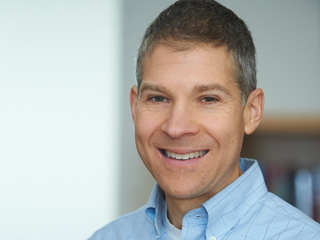Colin Powell School

If you had to answer the question, “Do you think that people are generally honest?” how would you answer or better yet, once answered, how would you measure this and what do you think the findings of your research would showcase?
This is what Colin Powell School Economics Professor Matthew Nagler set out to answer through data research and fact-finding in 2013 about social capital and how it has a direct effect of fatalities. His findings lead to the Freakonomics live show, “Tell me something I don’t know” where he presented on a stage in front of 500+ individuals that when social capital is greater, fatalities are lower, suggesting that social capital makes the roads safer.
We had a chance to speak with Professor Nagler about his experience on the show.
What was the process like for applying for this type of opportunity?
The initial inquiry came to me through a referral from then-Dean (now Associate Dean) Kevin Foster, back in September. I provided a quick description of some research I had done that I thought would make a surprising and interesting presentation to the layperson audience of the show. I then discussed it with one of the show’s producers Alvin Melathe, who said he thought it sounded promising and would get me on the show during the fall. There was a shuffle in terms of scheduling, and my piece was cut from the fall show I’d originally been scheduled for, though Alvin told me I would be on a future show. Sure enough, I heard from a different producer, Zack LIpinski, in February about doing the show in March. From there, it pretty much came together. I was asked to put together a question that would ask Stephen Dubner - kind of a puzzle - to which the answer would be a lead-in to my research presentation.
His question was: Cars have all kinds of great safety features these days: from anti-lock brakes and airbags to cars being able to brake automatically, if they sense a road hazard that the driver does not see. Now, what do you suppose we could do to improve road safety significantly that has nothing to do with the mechanics of the car, or the skill of the driver? Answer: Get people to trust one another...
Could you give a brief overview of the information/data/results that were derived from the 2013 article in Economic Inquiry, “Does Social Capital Promote Safety on the Roads?” and how that prompted you to come to the fact you presented?
In my 2013 article, I discuss an econometric study I conducted involving data from 48 US states over 10 years. I had data on traffic fatalities in each state in each year, and also data on several measures of social capital - mainly the extent to which people trust one another, as measured by asking people “Do you think that people are generally honest?”; but it is also sometimes measured in terms of measures of civic engagement - how often people go to church, how often they volunteer for charities, how often they work in community organizations, % of voter turnout locally, etc. Controlling statistically for a number of other factors that also affect traffic fatalities, I showed that when social capital is greater, fatalities are lower (that is, social capital makes the roads safer). The result holds up using various alternative measures of social capital, and it also holds up with respect to a number of different measures of road safety (# of accidents, serious injuries in accidents, and pedestrian fatalities - in addition of course to total traffic fatalities).
What was your overall experience like on the show?
The experience was lots of fun! I showed up before the show and immediately was introduced to the other 5 guests - three were academics (a psychologist, a mechanical engineer, and another economist), but two were non-academic “bigwigs”: Andy Byford, who is CEO of the NYC Transit Authority; and Polly Trottenberg, who is the Commissioner of the NYC Department of Transportation. One of the best parts of the evening was chatting with the other guests. Polly Trottenberg grilled me a bit on my research and critiqued a few things which, in her view from the practical side, were lacking in my study. It was quite enlightening. Anyway, I was the first of the six guests to take the stage. I thought that being on stage in front of a full house at the City Winery (~500 people I was told) would be nerve-wracking, but I found once I was standing in front of the microphone with the lights on me I got into a kind of “zone.” My wife, who attended with me, told me later that I had been up there for a long time - longer than any of the other academic guests - but I had no awareness of that.
What was the outcome of the show?
The show is billed as a sort of a game show - the “contestants” (of which I was one) presents their “facts” and then the audience decides which was the most surprising. I think they mainly do that as a conceit to make the show more exciting. Anyway, I didn’t win… that honor was shared by Andy Byford and Dr. Petra Moser of NYU who actually tied in the vote for most surprising presentation. Petra did have a really awesome “fact”: that Napoleon’s conquests were responsible to the success of Italian opera during the 1800s because Napoleon introduced copyright protection in the places he conquered! As for Andy, I think the audience were just enthralled to hear anything that had to do with the subways, which everyone rides!
Thanks for taking the time to speak with us!